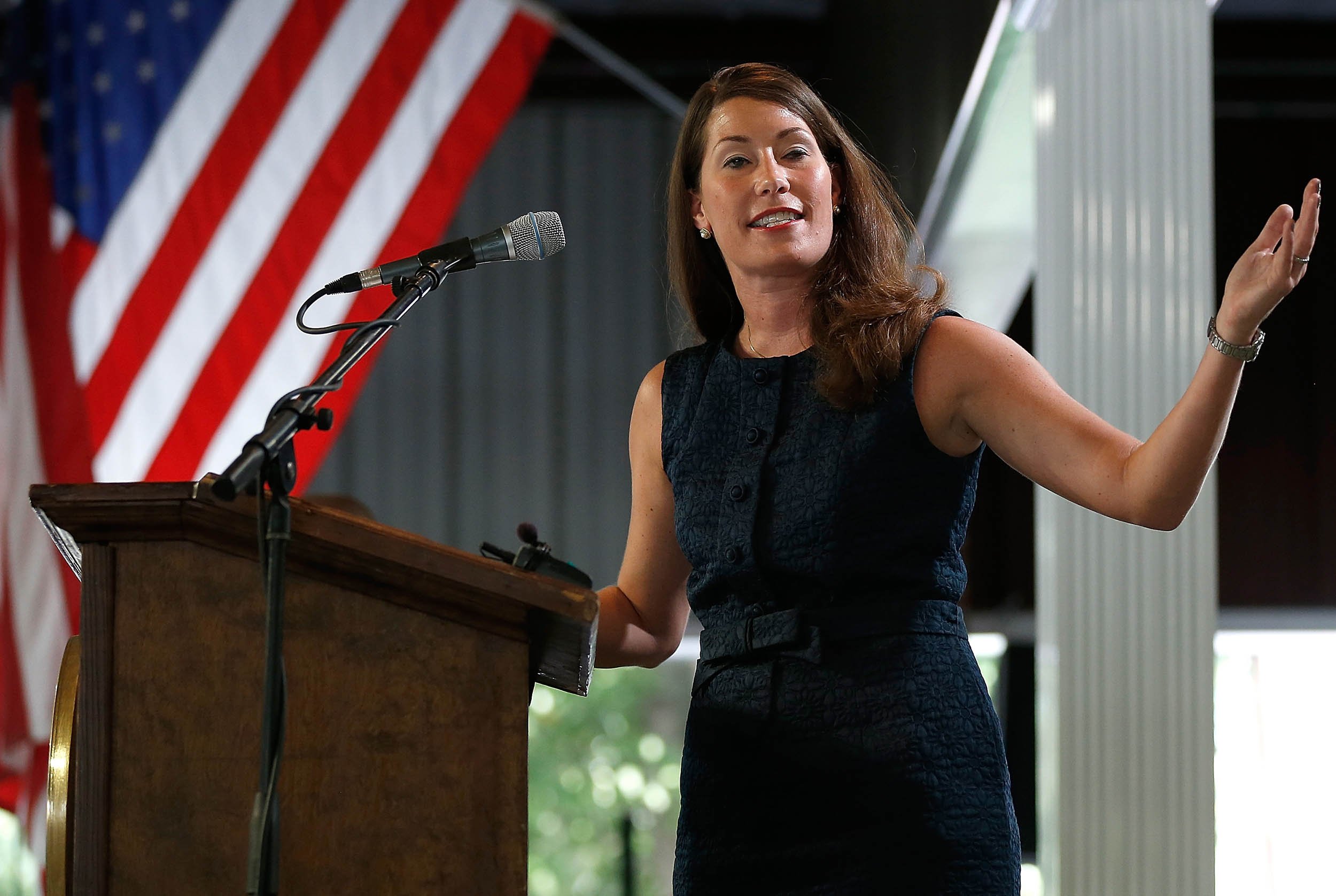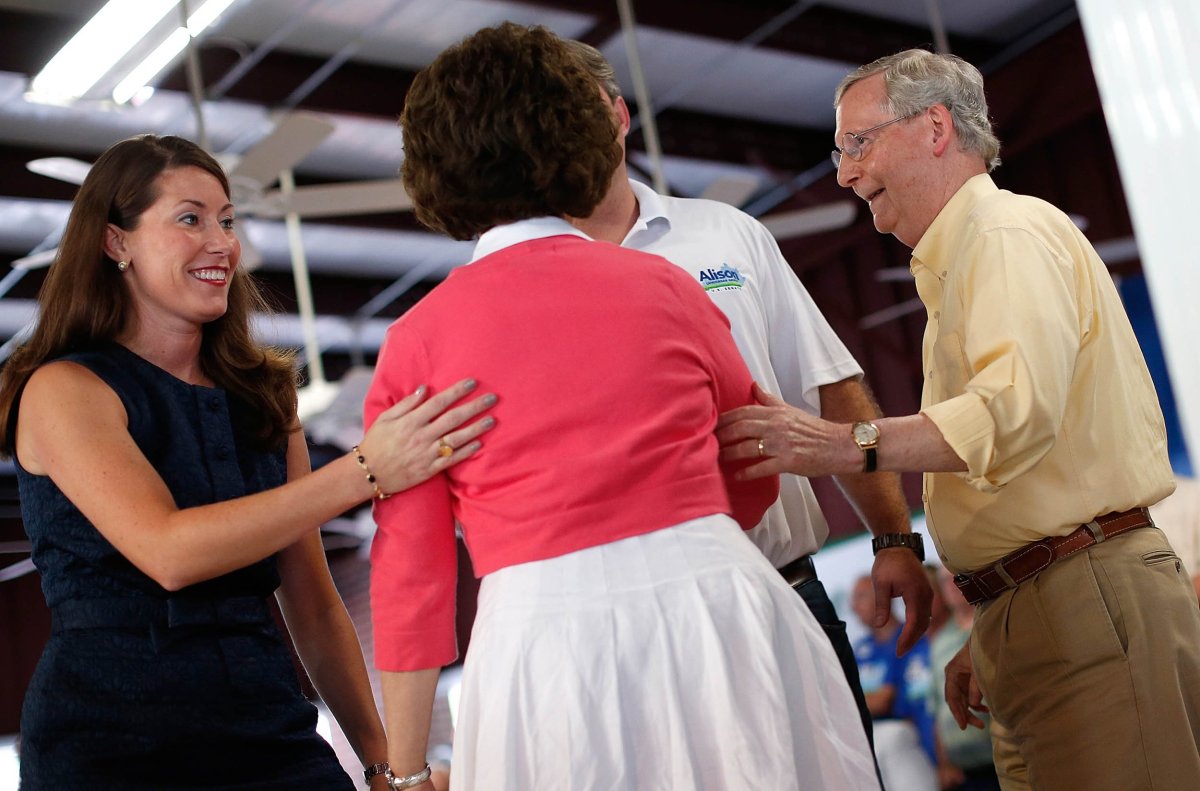
The windows were down and the brown GMC Savana van was picking up speed on the highway, headed for the Mississippi River. Except we were going in the wrong direction.
"We're going north," shouted the man in the back with the map. We needed to go south.
I came to cover the annual picnic in Fancy Farm, Kentucky, a political shouting match between Democrats and Republicans at the rural, western edge of the state. What began as a picnic for the local St. Jerome Catholic Church in 1880 has for decades now become the premier political event in Kentucky. Politicians from both parties rally their supporters—and get booed by the other side's supporters—and exchange barbs over the thundering audience.
This year drew the biggest crowd in the picnic's 134-year history, as around 5,000 Kentuckians from across the state (and press from around the country) gathered to watch Republican Senate Minority Leader Mitch McConnell, the 30-year incumbent, and his Democratic challenger, Secretary of State Alison Lundergan Grimes, do battle ahead of the November midterm elections.
The eyes of the nation are on the McConnell-Grimes matchup, in which the 35-year-old newcomer is giving McConnell, arguably the most powerful Republican in the country (and certainly the most loathed by Democrats) a run for his money.
The result of the race is certain to alter the course of politics in Washington for the next two years, as Kentucky is one of only two Republican Senate seats genuinely at risk– the other being Senator Saxby Chambliss's seat in Georgia.
Not only would a victory for Alison Lundergan Grimes give Democrats the biggest GOP scalp in the Senate, it would cause consternation among Republican senators who would have to elect a new group leader, setting off an ugly establishment versus Tea Party contest that would draw attention to the profound fissure among Republicans in the country.
A Republican defeat would also allow Democrats to keep their majority in the Senate, saving President Obama from two years of certain embarrassment from the House and Senate combining to oppose his every move.
But on my way to the picnic, I was taking a little detour.
The man in the back of the van shouting directions was Kentucky Supreme Court Justice Will T. Scott. I had met him about an hour earlier at the Graves County Republican Party breakfast, a pre-picnic tradition where Republican politicians give a preview of their speeches to a big room of true believers eating biscuits and gravy at the local high school. Scott, a Republican elected official from Eastern Kentucky with one eye on the governor's mansion next fall, drove across the state from impoverished coal country to Fancy Farm to attend the event with two of his best friends.
Driving the van was Randall Ray, 59, whose career has included various business ventures and odd jobs after he lost the use of his legs in a mining accident 39 years ago this month—he was 20 years old and married with an infant son at the time. These days he's taking it a bit easy, he said, "and taking care of the justice."
As Ray drove, the third friend, Donnie Story, a 69-year-old farmer, perched on Ray's wheelchair in a middle section of the van, which had been gutted to accommodate the special equipment Ray uses to lift him in and out of the vehicle. I had the front passenger seat.
While Scott and Story are Republicans, Ray is a Democrat.
In fact, he is just the kind of Democrat that Grimes needs behind her if she is going to upset McConnell.
Right now, the two nominees are running neck and neck, with McConnell up by a slim margin in most recent surveys. Grimes is trying to ride anti-incumbent sentiment by portraying McConnell as a career politician out-of-touch with the voters. McConnell won his 2008 reelection bid by just six points. Due to McConnell's unpopularity, polls show Grimes has been close on his heels since she entered the race 13 months ago. The latest poll, sponsored by local Kentucky media outlets, showed McConnell up by two points, 41 percent to 39 percent for Grimes.
Grimes's biggest obstacle is President Obama, who lost Kentucky by 16 points in 2008 and 23 points in 2012. McConnell is working to associate Grimes with Obama, hoping distrust of the Obama administration will rub off on his opponent.
Despite Obama's low approval ratings here, Kentucky is less solidly Republican than much of the South. On the federal level, Kentucky voters have picked a Republican for the White House since 2000, and have elected two Republican senators since 1998 and have sent a majority Republican delegation to the House of Representatives since 1994.
But those statistics don't capture the way Democrats have remained competitive at the state level. In the past 50 years, Kentuckians have only elected two Republican governors, and each served just one term. The current Democratic governor, Steve Beshear, is very popular. Democrats control the State House—the only legislative chamber controlled by Democrats in the South.
On paper, Grimes has an advantage because Democrats outnumber Republicans in registration. But that doesn't mean Kentucky is full of liberal voters. Outside its two biggest cities, Louisville and Lexington, Democrats are largely poor, rural and often vote for Republicans. They are called DINOs (Democrats In Name Only). To get elected this fall, Grimes will have to win back blue-collar Kentuckians like Ray. Or at least a fair number of them.
The importance of the region is not lost on the Grimes campaign. On Wednesday, former President Bill Clinton will travel to this impoverished piece of Appalachia for a Grimes rally. Clinton, who won Kentucky in both his presidential elections, remains popular in the eastern part of the state.
The Democratic Party contacted Ray about going to the Clinton rally, but he doesn't intend to go. He voted for Clinton in 1992 but not for his reelection. As for Hillary Clinton, he said, "If she can't protect the people in Benghazi, she definitely don't need to be president of the United States."
The three men, fast friends for years, have taken road trips together as far as Alaska. So you'd think they could find the Mississippi River. As Scott had told me at the GOP breakfast, his friends had never dipped their feet in the Mississippi, so they were going to do that now, and "you're welcome to go with us if you want."
Speeding down the highway, Ray tries to explain his political beliefs. He's a Democrat, but his views have been evolving, and he's thinking about switching parties. "I've been changing for a long time," he said.

Ray's home in Pike County is in Eastern Kentucky coal country, one of the poorest regions not only in the state but in the country. Since the 1930s, when federal money poured into the region to alleviate the effects of the Great Depression and the United Mine Workers gained a foothold there, coal country has been a Democratic stronghold. "It's been strongly Democratic ever since," said Scott, giving a history lesson from the back seat. For decades, the region was key to sending Kentucky Democrats to Washington. But today, the overwhelming registration of voters as Democrats doesn't translate into votes for Democrats.
In the past 15 years, as Democrats nationally embraced more environment-friendly policies, including an upcoming Environmental Protection Agency regulation for emissions from coal-fired power plants, the area has been trending from blue to red, at least in national elections. The region is producing a fraction of the coal it did decades ago and the endemic poverty in the area is only getting worse.
"We need to produce it," Ray said, referring to coal. "Our jobs are gone, income is going down."
As a local official put it to me: If you're not employed by the school district, you're not employed.
The declining coal industry in the region has taken on a central role in the Senate race. "We have a depression in Eastern Kentucky," McConnell said Saturday morning at the Graves County GOP breakfast. Obama's "war on coal," as he routinely calls the administration's policies, is "putting people out of work, they're going to drive our utility rates up."
McConnell hopes to tie Grimes to Obama, making her an enemy of coal by association. But Grimes is working just as hard to distance herself from the president. At the picnic Saturday afternoon, Grimes presented herself as a friend of coal and workers.
"When it comes to our Kentucky coal miners, well, Mitch McConnell doesn't care," Grimes shouted over the deafening cheers and boos from the crowd. "I do. I stand here today proudly endorsed today by the United Mine Workers of America."
Grimes's speech also made overtures to struggling blue-collar workers, calling collective bargaining "a fundamental right of our American workers," advocating for raising the minimum wage and promising that creating jobs in the state will be "my No. 1 priority."
After a few wrong turns, we finally got to the Mississippi River, and Ray found the hidden boat ramp. "A blind squirrel can find an acorn every now and then," Ray said as he steered the large van to within a few feet of the river's edge. I dipped my feet in. I taught Scott to use an iPhone camera so he could take a picture of me.
On the way back, I asked Ray when he last voted for a Democrat in a general election. He paused for a long time but couldn't recall. "I try to pick the person who wants to help working people," he finally said.
After the speeches ended, I found the three friends in the parking lot. Donnie, a staunch Republican, was worried because he was counting more Alison Grimes T-shirts in the crowd than "Team Mitch" ones.
I asked Ray who he would vote for, but he just shook his head.
"I really gotta do some thinking," he told me.
Uncommon Knowledge
Newsweek is committed to challenging conventional wisdom and finding connections in the search for common ground.
Newsweek is committed to challenging conventional wisdom and finding connections in the search for common ground.
About the writer
Pema Levy is a Washington Correspondent for Newsweek, covering Congress, elections and dabbling in court battles and other political miscellany. ... Read more
To read how Newsweek uses AI as a newsroom tool, Click here.








